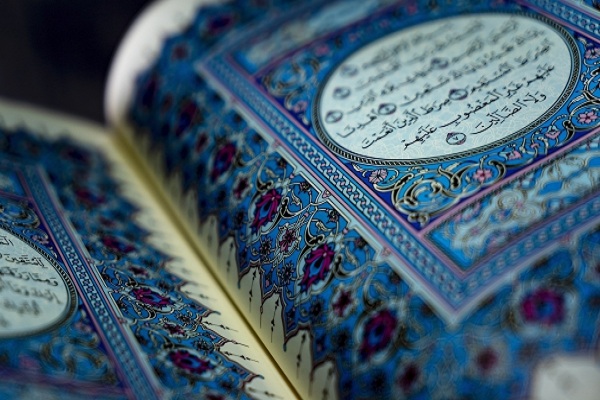What True Believers Are Like

The Quranic plan is annually organized in summer with the aim of promoting memorization of the Holy Book and spreading the Quranic culture and teachings in society.
This is the 1455th year since the revelation of the Holy Quran to the Holy Prophet (PBUH) and hence the name ‘1455’.
In this plan, every week some verses of the Quran with special themes are selected and their interpretations are discussed in various TV and radio programs.
Then a competition is held about the lessons and discussions.
Following is an interpretation of verse 177 of Surah al-Baqarah of the Holy Quran, given in the “1455 Quranic Plan”:
“Righteousness is not determined by facing East or West during prayer. Righteousness consists of the belief in God, the Day of Judgment, the angels, the Books of God, His Prophets; to give money for the love of God to relatives, orphans, the destitute, and those who are on a journey and in urgent need of money, beggars; to set free slaves and to be steadfast in prayer, to pay the religious tax (zakat) to fulfill one's promises, and to exercise patience in poverty, in distress, and in times of war. Such people who do these are truly righteous and pious.”
1- The word “Birr” (translated as righteousness in this verse) means good conduct and good behavior toward others. Those who fulfill their religious responsibilities as ordered by God are called Abrar while Fujjar are those who follow their whims and do not fulfil their responsibilities correctly. This verse says that righteousness cannot be achieved by observing only one aspect of the religion – such as the Qibla or direction of Kaaba which Muslims face during prayer – and neglecting others: “Righteousness is not determined by facing East or West during prayer”.
2- Then, the Quran outlines the behavior and viewpoint of true followers of the religion and shows that worshipping God is an integrated set of beliefs and religious and social responsibilities that every faithful must fulfil. It first refers to the beliefs and says: “Righteousness consists of the belief in God, the Day of Judgment, the angels, the Books of God, His Prophets”. This part outlines the need for every faithful man or woman to believe in five important things: Faith in God, faith in the Day of Judgment, faith in angels, faith in the truthfulness of the Divine books and their role in guiding people to salvation, and faith in the truthfulness of messengers of God.
3- In addition to having monotheistic beliefs, true followers of Islam act upon the commandments of God and do good deeds. Among the things they do is “to give money for the love of God to relatives, orphans, the destitute, and those who are on a journey and in urgent need of money, beggars; to set free slaves and to be steadfast in prayer, to pay the religious tax (zakat) to fulfill one's promises, and to exercise patience in poverty, in distress, and in times of war. Such people who do these are truly righteous and pious.”
Helping those in need is one of the outcomes of true faith – in God, the messengers and the Day of Judgement. In this verse, all of those who may need others’ help have been mentioned in order of preference. The phrase “to give money for the love of God” shows that the people of faith like money and wealth- naturally- and may even very much need the money themselves, but easily give it to the needy without making them obligated.
It has been narrated from Imam Sajjad (AS) that the man of faith gives his money in charity to those in need although he likes it or needs it very much himself because he is seeking a better life or is afraid of becoming destitute.



